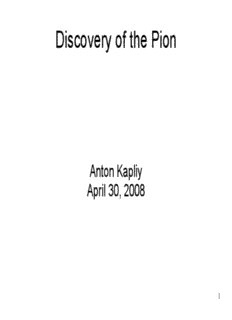
Discovery of the Pion & Anton Kapliy & April 30 - High Energy PDF
Preview Discovery of the Pion & Anton Kapliy & April 30 - High Energy
Discovery of the Pion Anton Kapliy April 30, 2008 1 Cecil Frank Powell 1903 - 1969 ● Wilson, Rutherford ● University of Bristol ● First pions in 1947 ● Nobel in 1950 ● Russel-Einstein msto ● CERN ● 2 Scientist in the making 12 yo — first chemistry book ● "Found it full of romance" 14 yo — first big experiment ● generated hydrogen "by the action of granulated – dilute sulphuric on granulated zinc" 3 Early life 1920's — Cavendish Labs ● 1932 — wedding, industry temptation ● 1930's-1940's — Bristol, British atomic project ● Starts experiments with photoemulsions – 4 Photographic emulsions Grains of silver-halide ● Suspended in gelatin ● Ionizing particles create Ag grains ● Develop a photograph ● 50 um emulsion 5 glass Problems with emulsions Low sensitivity to ionization (before 1947) ● Fading over time ● Non-uniformity of active material ● Hard to observe the tracks (too small) ● 6 Problems with emulsions Low sensitivity to ionization (before 1947) ● Fading over time ● Non-uniformity of active material ● Hard to observe the tracks (too small) ● Powell's response: Collaboration with the industry: Kodak, Ilford ● New sensitizing methods ● State of the art microsc opes 7 ● More problems Unable to use B-field to bend trajectories ● Compare with Wilson (aka cloud) chambers! – Cavendish dis-endorsement: ● incapable of "reliable and reproducible precision measurments" – 8 More problems Unable to use B-field to bend trajectories ● Compare with Wilson (aka cloud) chambers! – Cavendish dis-endorsement: ● incapable of "reliable and reproducible precision measurments" – 20000 stereoscopic photos => 1600 usable traces Powell's response: 3000 traces on a 3 cm^2 photographic plate But photoplates have continuous uptime ● Can deduce a lot about nature of particles ● Powell's determination ● 9 – "The right man pushing exactly the right experimental technique at the right time" Q: Where do we look for Yukawa mesons? A: Cosmic rays! Mt. Pic Du Midi, 10000 ft Flying baloons, >10000 ft 10
Description: